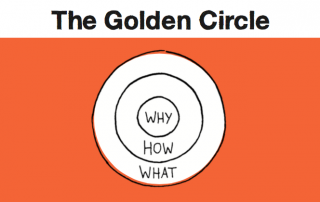Having a vision is an incredibly important ingredient to having a great life. It is the “what” that we often pursue: more money, more fame, more of simply everything.
But is the “what” really a driving force that can sustain us?
I think not.
Even if we can define our “what”, our vision, our deep-seated desire to articulate that which our hearts bleed for, we may not be sure how to get there.
So we look to the “how” of things. How can we attain that which we hope for? Yearn for? Want more than anything?
I used to believe that if we knew what we wanted, the how would come.
How wrong I have been.
Simon Sinek, the author of Start With Why: How Great Leaders Inspire Everyone to Take Action, says that we should start with the reason why we do things. Two-year-olds know this. They ask “Why” all the time. They embrace what Sinek calls the golden circle. Start from the center and everything else will come. But somewhere along the line, children accept the adults’ answer that it’s because we say so.

What kind of answer is that?
Why is where the heart is. It goes beyond our rational thinking to a deeper, more innate understanding. Why lives on a completely different plane.
Change can only really happen effectively if we understand why. So if an organization is undergoing change, employees need to get a grasp on the reasons for the change. “Why should I care?” Answer that question and people will follow you anywhere — or lead others down the path you intend to take them.
Have you ever considered why you do things?
Why do I write? Why do you take pictures? Why does she selflessly help other people? Why does he get up again and again after yet another defeat?
The “why” of things is the underlying power that inform our days. It is equivalent to our life’s purpose. It is the very reason we are here.
Understanding the “why” of things not only helps us accept change, it also helps us learn better. My son recently changed schools. For years he struggled with the German school system — an institution that insists students learn the “what” of things. “How” was even harder and it seemed as if no amount of tutoring was going to help him because he never, ever understood why he was supposed to learn the things they told him to learn.
Why do we learn math? Why do I need to know the inner workings of a cell? My son knew he needed to make a change. Why? Because he wanted to learn. Along with his very powerful reasons, a series of circumstances and good fortune brought him to a new school where his teachers actually took the time to tell him why. And magically he has never been as motivated to run out the door to school as he is today.
The same applies to our lives as adults. Why do we want to achieve certain things? What are our motivations?
Have you ever wondered why certain tasks seem effortless? Why with some things you enter a space of flow, and with other tasks it feels like carrying a boulder uphill to the stars?
When we know why we are doing something (love is a really good reason), we just do it. Without question. Without faltering. With an effortlessness that makes us heroes in our every day stories.
Ask yourself why you do what you do. Do you have the answer? Are you satisfied with the answer you tell yourself? If not, put down that boulder and make a change toward who you really are.
Why? Because your life depends on it.
Originally published at Psychology Today
